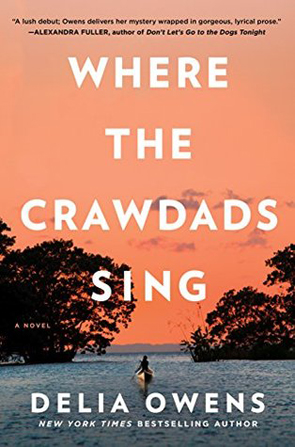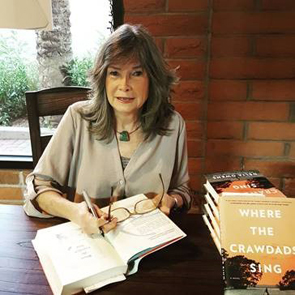Warning - this review contains spoilers. Many, many spoilers!
“Female fireflies draw in strange males with dishonest signals and eat them; mantis females devour their own mates. Female insects, Kya thought, know how to deal with their lovers.”
Many of the descriptions of this book mention that a body is discovered and that the ‘Marsh Girl’ (Kya) is suspected of murder. And it's true that this is part of the plot and there is a murder trial. But the book is more about small town prejudices and events leading up to Kya's murder trial than a real murder mystery. In a way the book is similar to Harper Lee's To Kill a Mockingbird for its examination of small-town prejudice.
The story is told in two timelines: it starts in 1969 with the discovery of the body of Chase Andrews at the bottom of an abandoned fire tower outside the town. This timeline continues, following the investigation, until Kya Clark is arrested and tried for murder. The second timeline starts in 1952 when Kya is six and abandoned by her mother. Her brothers and sisters also leave soon after this, leaving Kya alone with their violent, alcoholic father. He also eventually leaves and Kya is left to fend for herself when she is ten years old, living in the marsh as an outcast from the local community. Kya learns by watching the wildlife in the marsh how to support and protect herself. Her contact with other humans is extremely limited for most of the book. She is on friendly terms only with Jumpin, a black man who runs a Bait and Gas store out of town and who buys mussels from her, Jumpin’s wife Mabel who provides her with clothes and necessary female advice, and Tate, the son of a local fisherman.
Tate has similar interests to Kya. He is fascinated by the wildlife in the marsh and wishes to study biology. He meets Kya when she is about thirteen years old, befriends her and teaches her to read. Tate and Kya's friendship eventually becomes a romantic relationship which ends when Tate leaves town for college. Although he intends to return to Kya, he realises that she could never fit in to his world of academic studies, and decides to not see her when he visits his family.
Feeling abandoned by Tate, after finally letting another human get close to her after her family’s abandonment, Kya meets Chase, the local golden boy: good looking, from a wealthy family, and star football player. Chase woos Kya and eventually seduces her with talk of marriage and the promise of a life they will have together. Meanwhile, Tate returns to the town to work in a newly built research facility while completing his PhD, and realises that he still loves Kya and was stupid to leave her. He warns Kya that Chase has other girlfriends in town but she pays no attention to his comments. But one day Kya randomly reads a local newspaper and learns of Chase's engagement to another woman and understands he has been using her only for sex. Betrayed once again, Kya buries herself in the world of her swamp, interested only in the wildlife she has become an expert on. She has taught herself to paint over the years, supported by Tate who gave her paints when they first met. Tate takes her paintings to a publisher and her first book is published, giving her fame outside her town, but remaining isolated within it.
Chase re-enters her life and attempts to rape her. She fights him off but is badly beaten and realises she can never feel safe in her marsh while he is around. At this point the two storylines come together. Kya is arrested for Chase's murder, despite there being little evidence to support the charge and despite her having an alibi to show she was out of town meeting her publisher on the night of the murder.
Up to this point, I was loving this book. The strength of this book is in the descriptions of the marshes in the Kya’s timeline. I could read these passages forever. They create such a perfect picture of Kya's world, along with Kya, herself: Kya, who has always seemed to have an innocent and childlike nature, and is completely unequipped for coping with the modern world; Kya, who wants nothing more than to have someone in her life who will not leave her; Kya, who despite being uneducated, has become a published naturalist with a highly regarded book. I was completely engrossed in this story until the beginning of the murder trial and the later chapters. In short, at that point I became disappointed.
For starters, the trial result was extremely unrealistic. I actually like the courtroom scenes. They were well done and Kya had a brilliant lawyer who skilfully ripped the prosecution’s arguments apart. But I earlier compared this book with To Kill a Mockingbird where an outsider is on trial in a prejudiced society. That book has a realistic outcome, where the accused is found guilty despite the lack of evidence and a brilliant lawyer. And while it is possible a verdict of innocence may have been returned, Owen’s establishment of the town’s prejudices and its culture makes it unlikely and unrealistic. The establishment of the townspeople’s prejudices against the ‘Marsh Girl, ’along with the social position of Chase's family in the town give the not guilty verdict little credibility. In real life Kya might eventually be found not guilty after an appeal when the trial moved to another town with an unbiased jury, but I just can't see a not guilty verdict being the result of the first trial. No matter how well her lawyer demonstrated that there was no way she could physically have committed the murder, those townsfolk would have convicted her. That is the only sense one can draw from the trajectory of the first part of the novel.
Of course, having to go to an appeal would have bulked out the book with legal issues and clouded what the story was really about. With the trial over, we get back to the heart of the story, about how Kya overcomes everything against her to survive in the marsh, and to finally end up happy with Tate and reconciled with one of her brothers, returned just before her arrest.
And then we get the slammer in the final pages. I've already put a spoiler warning at the head of this review, but here’s another warning: what comes next is a complete spoiler if you ever intend to read this book. Kya and Tate live happily ever after together in the marsh until Kya suddenly dies aged sixty-four. Tate then discovers a hidden box which contains proof that Kya did actually murder Chase.
Right. Of course she did. Despite the brilliance of her lawyer who proved that there was no way she could possibly have returned to town on a late bus, taken her boat (left at a public wharf in the town) to the beach near the fire tower, made her way up to the fire tower, killed Chase at the fire tower, removed all evidence that she'd been there, taken her boat back to town, and caught the last bus back to the City all within the 50 minutes between the time one bus arrived in town and the other left town. And that she left and returned to her hotel without being seen by the hotel manager when her room was directly across from reception. And that her alleged disguises were never found (an unidentified man was on the first bus and an unidentified woman was on the second bus), and no evidence was found that this girl who rarely left her marsh had ever bought disguises. Or that she could have planned such an elaborate scheme, worthy of a Ngaio Marsh plot, despite there being no evidence that she had any knowledge of criminal procedures and what she would need to do to create such an ironclad alibi.
Add to this, that if she killed Chase, it is never shown how she managed to get him to meet her at the abandoned fire tower in the middle of the night. The last contact they have with each other had been a month earlier when she kicked him in the balls and screamed that she would kill him if he came near her again. I don't doubt that Chase would have the confidence that he could overpower her. I just doubt that he would have been foolish enough to meet her in those circumstances. Especially since in a small town it wouldn't be unlikely that he would hear the gossip that the Marsh Girl had caught a bus to the city that afternoon. She could hardly write him a letter suggesting the assignation. That would leave evidence which could be found and used against her.
I don't doubt that Kya has the motive to murder Chase. She knows she can never assume she is safe from him and will have to be on guard at all times. And her thinking allows it, too. She thinks of everything in terms of biology and knows how insects and other animals deal with an inconvenient male. Kya knows she has to protect herself and survive, as she has always had to do. I just can't see how we're meant to believe that she murdered him in the way that was presented in this book.
I also have an issue with a scene the day after Kya is freed. Tate's father dies from a heart attack. He has been a very minor character. There are a few scenes with him and Tate when Tate first meets Kya which shows the close relationship between father and son. Then we see nothing more of him until the last day of Kya's trial when he suddenly appears in the courtroom to sit with Tate and the few other people who are there in support of Kya. He’s had a sudden epiphany of Kya's worth and of the need to support his son. All good stuff. It is nice to see that Kya does have a few people on her side, but why bring him into the story at this point and just kill him off the next day? The only reason for his death appears to be so that the Sheriff can go out in a boat with several other officers to find Tate on his research vessel in the marsh, so that Kya, hearing the boats, will see Tate being taken away by the sheriff and think he had been arrested. I think we are meant to assume that the Sheriff has belatedly figured out that Tate has killed Chase to protect Kya. But this isn’t developed and the very next scene is the father’s funeral, so we aren't left to think Tate is the murderer for long and any dramatic tension it might have caused is immediately dissipated. Tate would have been a good murderer, or perhaps Jumpin, as both of them know Chase attacked Kya, and both of them want to protect her. But after the father's funeral, we forget all about Chase and are left to think that maybe his death was just an accident. It had, after all, been part of Kya’s lawyer’s arguments that the prosecution had not actually proved that a murder had even been committed, and that it was likely that Chase had gone to the tower by himself and had accidentally fallen. So, we forget all about Chase until the final pages of the book when Tate finds the evidence that Kya had hidden. In the end it all seems a clumsy grab for a twist in the tale of the story that wasn’t needed.
So, while I loved most of this book and had anticipated giving it a higher rating, I found the trial and the rest of the book disappointing. I'd still recommend this book. It was beautifully written and I think many people could easily overlook the problems I had with the ending and just be happy that Kya's story ended happily, back with her first love, Tate.

 RSS Feed
RSS Feed Facebook
Facebook Instagram
Instagram YouTube
YouTube Subscribe to our Newsletter
Subscribe to our Newsletter





No one has commented yet. Be the first!